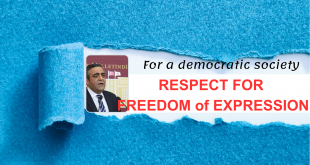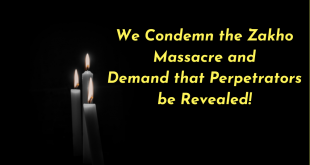The subcommission formed under the Parliamentary Commission to Investigate Human Rights Violations failed to take steps that might lead to the establishment of a National Human Rights Institution in compliance with international principles.
14 June 2012
The draft Law on Human Rights Institution of Turkey was on the agenda of the Parliament during the previous legislative period and annulled due to the general elections of 12th of June 2011. The Council of Ministers submitted this draft to the Parliament on 5th of March 2012, which referred it to the relevant Parliamentary Commissions on 15th of March 2012.
The Parliamentary Commission to Investigate Human Rights Violations has recently submitted the draft Law on Human Rights Institution of Turkey to the Parliament for a vote, without revising the former (annulled) draft that was highly criticized for failing to meet the “independency” criterion among others.
We were surprised and seriously concerned when the government submitted this draft to the Parliament again, without making any changes in the former draft, despite the fact that human rights organizations at national and international level, academics, lawyers and even the public institutions and governmental organs had publicly criticised and objected to the former draft law.
In our statements, we have repeatedly pointed that the draft was unacceptable because:
- The draft has been prepared without taking the principles of participation, comprehensiveness and transparency into account in accord with the international criteria.
- The draft is largely based on a state-centred approach, rather than an individual/citizen-centred approach.
- National Human Rights Institution as proposed in the draft law is simply designed as a government agency similar to the existing human rights bodies.
- National Human Rights Institution is designed as a presidency mechanism similar to all previous human rights bodies. There is almost no option for the institution to carry out its functions against the will of its president.
- The members are appointed on the initiative of the government and no objective membership criteria have been defined.
- The Draft does not sufficiently secure the independency and impartiality of its members and it does not ensure especially the financial independency of the institution. The institution must have its own independent budget line and a substantial part of its budget should be allocated from the general budget with the approval of the Parliament.
- According to the draft, the structure and number of personnel is subject to the General Personnel and Recruitment Law No. 190 and this regulation will negatively affect the independency of the institution.
- The draft does not secure the pluralistic representation and participation of the board members.
Despite the fact that our recommendations and criticisms have not been taken into account up to the date, we, the human rights organizations have always maintained a positive attitude for dialogue and cooperation. As an expression of this attitude, we sincerely continued our efforts to establish dialogue with relevant commissions of the Parliament and with the government after the elections. Within this frame, we participated at the meeting of the subcommisison established for conducting a review on the NHRI Draft Law under the Parliamentary Commission to Investigate Human Rights Violations. A total of 12 NGOs/ organizations, including the helsinki Citizens’ assembly, Human Rights Association, Human Rights Foundation of Turkey, Mazlumder, Amnesty International Turkey, TOHAV, Union of Turkish Bar Associations, bar associations of Ankara, ?zmir and Diyarbak?r, Hacettepe University Human Rights Centre and TODA?E were invited to participate in this meeting that was held on 18 April 2012. The five human rights organizations making this statement submitted an evaluation report to the members of the subcommission at this meeting. All of the remaining participants openly declared that they completely agreed with the comments of the five human rights organizations and that the draft law was unacceptable. All of the participants declared that they were willing and ready to cooperate with the government and other relevant organs for producing a new draft which would base on Paris Principles. Members of the subcommission simply listened to these comments, without making comments on or objections against the statements of human rights NGOs and other participants at this meeting.
Now we have learned that the subcommission had completed its assignment, but without taking our comments and recommendations into consideration and indeed without carrying out an original work: The subcommission simply copied the draft law that was prepared by the Parliamentary Commission on Constitution during previous parliamentary term.
This attitude of the subcommisison, which simply conducted a copy-paste task, clearly rules out the Paris Principles, which recommend a procedure that affords all necessary guarantees to ensure the pluralist representation of the social forces (of civilian society) involved in the protection and promotion of human rights for defining the composition of the national institution and the appointment of its members. Apart from this, this attitude gives us the impression that all we have been flogging a dead horse. We have been working for the establishment of a NHRI for many years now, and we will not let them steal / ignore our time and efforts in this regard.
In conclusion;
We would like to emphasize once again that despite the fact that national human rights institutions are established with law, it is the letter and spirit of Paris Principles that these institutions are independent of other state organisations and political power. The need for establishment of national human rights institutions arises from a simple contradiction, which is “potential human rights violators cannot be protector of these rights at the same time.” It is a universally known fact that the biggest human rights violators are the states and governments. Therefore, an institution established for preventing human rights violations and for protecting these rights has to have an organisational model that is absolutely independent of government hierarchy and that can monitor and control the government independently.
However, the draft law enables the Council of Ministers to appoint members of the NHRI without basing on any criteria, vests all of the authority with the chair of the institution, and above all defines the tasks of the “national preventive mechanism”, which should enjoy absolute independency, under the NHRI; and the resulting NHRI will by no means be an independent institution that can prevent human rights violations and protect the human rights.
It is irrational to insist on enacting the draft which has been widely criticized by various circles on the basis of universal standards and values which are the outcomes of collective reason and experience of the human family, and the outcome of this draft, the NHRI will not be able to perform the tasks in line with the universal standards.
We would like to remind the government of its responsibility for establishing a NHRI in compliance with the universal standards. We would also like to invite the Parliamentary Human Rights Commission, The General Assembly and opposition parties to take responsibility and action for this task.
As a group of rights-based civil society organizations, we will carry out all necessary activities in cooperation with other rights-based organizations and NGOs countrywide for the establishment of a proper national human rights institution which shall serve common objectives, be independent and shall effectively prevent human rights violations and protect the human rights.
helsinki Citizens’ assembly
Human Rights Association
The Association of Human Rights and Solidarity for Oppressed People
Human Rights Foundation of Turkey
Amnesty International-Turkey
 HRJP Human Rights Joint Platform
HRJP Human Rights Joint Platform



